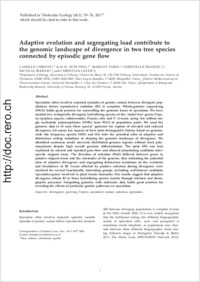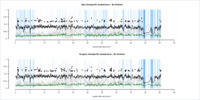Adaptive evolution and segregating load contribute to the genomic landscape of divergence in two tree species connected by episodic gene flow
- Christe, Camille Department of Biology, University of Fribourg, Switzerland
- Stölting, Kai N. Department of Biology, University of Fribourg, Switzerland
- Paris, Margot Department of Biology, University of Fribourg, Switzerland
- Fraїsse, Christelle Institut des Sciences de l'Evolution (UMR 5554), Montpellier, France - Station Méditerranéenne de l'Environnement Littoral, Université Montpellier 2, Séte, France
- Bierne, Nicolas Institut des Sciences de l'Evolution (UMR 5554), Montpellier, France - Station Méditerranéenne de l'Environnement Littoral, Université Montpellier 2, Séte, France
- Lexer, Christian Department of Biology, University of Fribourg, Switzerland - Department of Botany and Biodiversity Research, University of Vienna, Austria
-
01.01.2017
Published in:
- Molecular Ecology. - 2017, vol. 26, no. 1, p. 59–76
English
Speciation often involves repeated episodes of genetic contact between divergent populations before reproductive isolation (RI) is complete. Whole-genome sequencing (WGS) holds great promise for unravelling the genomic bases of speciation. We have studied two ecologically divergent, hybridizing species of the ‘model tree’ genus Populus (poplars, aspens, cottonwoods), Populus alba and P. tremula, using >8.6 million single nucleotide polymorphisms (SNPs) from WGS of population pools. We used the genomic data to (i) scan these species’ genomes for regions of elevated and reduced divergence, (ii) assess key aspects of their joint demographic history based on genomewide site frequency spectra (SFS) and (iii) infer the potential roles of adaptive and deleterious coding mutations in shaping the genomic landscape of divergence. We identified numerous small, unevenly distributed genome regions without fixed polymorphisms despite high overall genomic differentiation. The joint SFS was best explained by ancient and repeated gene flow and allowed pinpointing candidate interspecific migrant tracts. The direction of selection (DoS) differed between genes in putative migrant tracts and the remainder of the genome, thus indicating the potential roles of adaptive divergence and segregating deleterious mutations on the evolution and breakdown of RI. Genes affected by positive selection during divergence were enriched for several functionally interesting groups, including well-known candidate ‘speciation genes’ involved in plant innate immunity. Our results suggest that adaptive divergence affects RI in these hybridizing species mainly through intrinsic and demographic processes. Integrating genomic with molecular data holds great promise for revealing the effects of particular genetic pathways on speciation.
- Faculty
- Faculté des sciences et de médecine
- Department
- Département de Biologie
- Language
-
- English
- Classification
- Biological sciences
- License
-
License undefined
- Identifiers
-
- RERO DOC 279066
- DOI 10.1111/mec.13765
- Persistent URL
- https://folia.unifr.ch/unifr/documents/305221
Other files
Statistics
Document views: 157
File downloads:
- pdf: 329
- Supplementary material: 149
- Table S1: 65
- Table S2: 166
- Table S3: 155
- Table S4: 64
- Table S5: 66
- Table S6: 131
- Table S7: 64
- Table S8: 65


